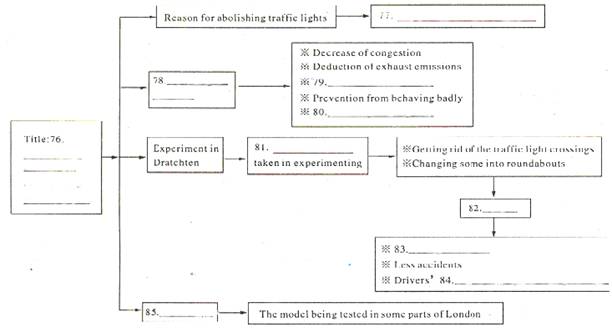题目内容
There are two types of people in the world. Although they have equal degree of health and wealth and other comforts of life, one becomes happy and the other becomes unhappy. This arises from the different ways in which they consider things, persons, events and the resulting effects upon their minds.
People who are to be happy fix their attention on the convenience of things: the pleasant parts of conversation, the well prepared dishes, the goodness of the wine and the fine weather. They enjoy all the cheerful things. Those who are to be unhappy think and speak only of the opposite things. Therefore, they are continually dissatisfied. By their remarks, they sour the pleasure of society, offend many people, and make themselves disagreeable everywhere. If this turn of mind was founded in nature, such unhappy persons would be the more to be pitied. The intention of criticizing and being disliked is perhaps taken up by imitation (模仿). It grows into a habit, unknown to its possessors. The habit may be strong, but it may be cured when those who have it realize its bad effects on their interests and tastes. I hope this little warning may be of service to them, and help them change this habit.
Although in fact it is chiefly an act of the imagination, it has serious results in life since it brings on deep sorrow and bad luck. Those people offend many others; nobody loves them, and no one treats them with more than the most common politeness and respect. This frequently puts them in bad temper and draws them into arguments. If they aim at getting some advantages in social position or fortune, nobody wishes them success. Nor will anyone start a step or speak a word to favor their hopes. If they bring on themselves public objections, no one will defend or excuse them, and many will join to criticize their wrongdoings. These should change this bad habit and be pleased with what is pleasing, without worrying needlessly about themselves and others. If they do not, it will be good for others to avoid any contact with them. Otherwise, it can be disagreeable and sometimes very inconvenient, especially when one becomes mixed up in their quarrels.
63. People who are unhappy _______.
A. always consider things differently from others
B. usually are affected by the results of certain things
C. usually misunderstand what others think or say
D. always discover the unpleasant side of certain things
64. We can conclude from the passage that _______.
A. we should pity all such unhappy people
B. such unhappy people are dangerous to social life
C. people can get rid of the habit of unhappiness
D. unhappy people can not understand happy persons
65. If such unhappy persons insist on keeping the habit, the author suggests that people should _______.
A. prevent any communication with them
B. show no respect and politeness to them
C. persuade them to recognize the bad effects
D. quarrel with them until they realize the mistakes
66. In this passage, the writer mainly _______.
A. describes two types of people
B. laughs at the unhappy people
C. suggests the unhappy people should get rid of the habits of unhappiness
D. tells people how to be happy in life
DCAC
解析:
63. D. 细节理解题。由第二段第3句可以看出另一些人感到不幸福的原因。
64. C. 细节判断题。由第二段倒数第2句可以判断出人们可以改变不幸福的脾性。
65. A. 细节判断题。由第三段倒数第2句可以看出作者的想法。
66. C. 主旨大意题。本文主要讲的是那些感觉不幸福的人处处冒犯别人,若长期以往,则只能处于被孤立的境地,所以他们应改变自己的习惯。

 天天向上一本好卷系列答案
天天向上一本好卷系列答案 小学生10分钟应用题系列答案
小学生10分钟应用题系列答案